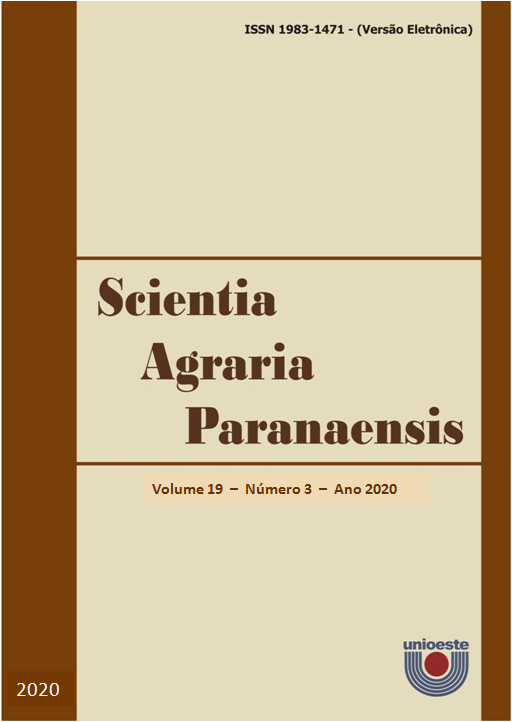Phosphate fertilization and organic compost on the initial growth of sorghum in degraded soils
DOI:
https://doi.org/10.18188/sap.v19i3.24506Resumo
One of the strategies for the recovery of degraded soils is the planting of fast-growing forage species with high biomass production. In this sense, the objective of this research was to evaluate the initial growth of sorghum in degraded soils with organic fertilization and different phosphorus levels. A completely randomized design with a 4 x 3 x 2 factorial arrangement was used, with four soil types, three levels of phosphorus fertilization and two levels of organic fertilization. At 64 days after sowing the characteristics of the initial growth were analyzed: plant height, stem diameter, leaf number and fresh shoot mass. The height was measured by measuring the neck of the plant until the end of the newest fully expanded leaf, measured with the aid of a measuring tape and expressed in centimeters. The diameter of the stem, by means of a digital pachymeter. The application of phosphorus and organic matter in degraded soils is necessary for the initial development of sorghum plants, due to the low availability of this element, caused by the high adsorption of P in the soil colloids. Besides that, the lack of organic matter in the studied soils led to a decrease in the growth of sorghum, therefore, it is concluded that soil management in saline environments is necessary for the application of phosphorus and organic matter for a sustainable and technically viable production.
Downloads
Publicado
Como Citar
Edição
Seção
Licença
Aviso de Direito Autoral Creative Commons
Política para Periódicos de Acesso Livre
Autores que publicam nesta revista concordam com os seguintes termos:
1. Autores mantém os direitos autorais e concedem à revista o direito de primeira publicação, com o trabalho simultaneamente licenciado sob a Licença Creative Commons Attribution que permite o compartilhamento do trabalho com reconhecimento da autoria e publicação inicial nesta revista.2. Autores têm autorização para assumir contratos adicionais separadamente, para distribuição não-exclusiva da versão do trabalho publicada nesta revista (ex.: publicar em repositório institucional ou como capítulo de livro), com reconhecimento de autoria e publicação inicial nesta revista.
3. Autores têm permissão e são estimulados a publicar e distribuir seu trabalho online (ex.: em repositórios institucionais ou na sua página pessoal) a qualquer ponto antes ou durante o processo editorial, já que isso pode gerar alterações produtivas, bem como aumentar o impacto e a citação do trabalho publicado (Veja O Efeito do Acesso Livre).
Licença Creative Commons
Esta obra está licenciada com uma Licença Creative Commons Atribuição-NãoComercial-CompartilhaIgual 4.0 Internacional, o que permite compartilhar, copiar, distribuir, exibir, reproduzir, a totalidade ou partes desde que não tenha objetivo comercial e sejam citados os autores e a fonte.


